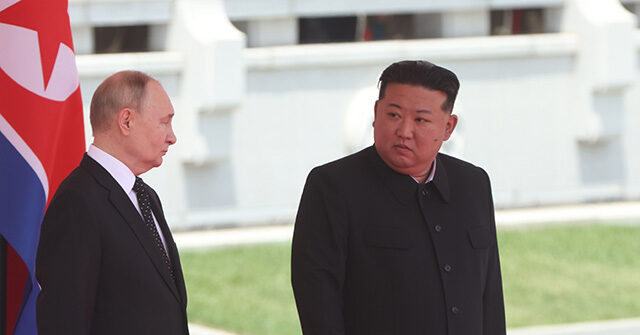Members of Ukraine’s federal lawmaking body, the Verkhovna Rada, told Congress during a virtual briefing on Thursday that Russia’s ability to persist in invading their country is largely a result of support from U.S.-designated state sponsors of terrorism Iran, Cuba, and North Korea.
The State Department’s official list of state sponsors of terrorism consists of those three states and Syria, although the administration of President Donald Trump is expected to soon drop Syria from the list in the aftermath of the collapse of Bashar Assad’s dictatorship. The Department defines state sponsors as those who have “repeatedly provided support for acts of international terrorism.”
Speaking to American lawmakers, Ukrainian lawmaker Maryan Zablotskyy, who chairs the Free Cuba Caucus of the Verkhovna Rada, argued that Russia relies heavily on the designated state sponsors of terrorism to continue its invasion – and that sanctions targeting this particular support for Moscow could critically damage the Russian war effort.
“Currently, for example, 60 percent of artillery shells [used against Ukraine] come from North Korea. Without North Korean artillery shells, they are done,” Zablotskyy argued. “Most of the damage to our infrastructure comes from Iranian drones – by the way, they are partially assembly in Venezuela, but that’s another topic.”
“Without the military support from state sponsors of terror, Russia would have already stopped their attack,” Zablotsky posited, asking the lawmakers present to look into “develop[ing] some legislation that can help at least Russia stop the use of the state sponsors of terror.”
The third state sponsor of terrorism, Cuba, was the central topic of the briefing in question – namely, the “presence of Cuban regime troops fighting for Russia in Ukraine.” The briefing was hosted by Rep. Mario Díaz-Balart (R-FL) and attended by Reps. María Elvira Salazar (R-FL) and Rep. Carlos Giménez (R-FL). Orlando Gutiérrez-Boronat, the coordinator of the Assembly of the Cuban Resistance, moderated the briefing.
Like North Korea – which has openly admitted to deploying thousands of troops to the Ukraine war theater – Cuba has also flooded the battlefield with its people. The Communist Party of Cuba has denied being involved in the Russian invasion in any way and claims to be fighting “human traffickers” sending mercenaries over, but the Ukrainian government has rejected that claim, asserting it has evidence Havana is deliberately funneling men over for the war effort.
“We have identified at least 20,000 Cubans recruited by Russia,” Andriy Yusov, a spokesman for Ukrainian military intelligence, told the briefing, as translated live by Zablotskyy. “Cuba is ranked at the top of the list of sources of foreign mercenaries. Currently our good intelligence tells us about 20,000 people from Cuba who have already filled out the documents and have been recruited to fight for Russia.”
Yusov stated that hundreds of those still fighting have fulfilled their contracts but are being “kept there by force.” He also stated that the Ukrainian government believes the average Cuban fighter in the Ukraine war is 35 years old and receives a salary of $2,000 a month: “It is not a significant amount of money but, for the impoverished people of Cuba, this is a significant argument.”
“It is beneficial for [Vladimir] Putin’s regime to attract Cuban mercenaries,” Yusov argued. “If a foreigner dies, there are no social payouts and no responsibilities. There are no relatives inside Russia to make unhappy with the war and, of course, less dead Russians and, of course, propaganda method about global support of Putin’s war [sic throughout].”
Also addressing the briefing was another member of the Ukrainian parliament’s Free Cuba Caucus, Oleksandr Merezhko, who argued that Ukraine was not fighting off a Russian invasion, but an international effort by an “axis of evil.”
“We should remember that there is a whole coalition of authoritarian and even totalitarian regimes fighting against Ukraine,” he explained. “Among these regimes are the Belarussian regime of dictator [Alexander] Lukashenko, Iran, North Korea, China – which is providing lifeline to Russian war machine – and, of course, Castro regime in Cuba.”
Cuba, he added, as a “special role” as the “major arm of the Russian terrorist regime in Latin America.”
“The Castro regime helps Russia wage war against Ukraine not only by providing troops … but also by spreading Russian propaganda in Latin America,” he explained, “helping politically, diplomatically, trying to undermine [the] position of Ukraine among Latin American countries. We’re dealing with an axis of evil.”
In addition to evidence that Cuba aids in spreading propaganda in Latin America, extensive reporting on social media in Russia indicates that many of the Cuban fighters in the Ukraine war theater are also helping produce propaganda to sell the war to Russians.
Merezhko argued that the destruction of the Putin regime in Russia would bring about the “liberation of the Cuban people” and encouraged European countries that offer the Castro regime financial aid and tourism revenue to reconsider, as that money helps the Cuban Communist Party back the invasion of Ukraine.
Follow Frances Martel on Facebook and Twitter.
















